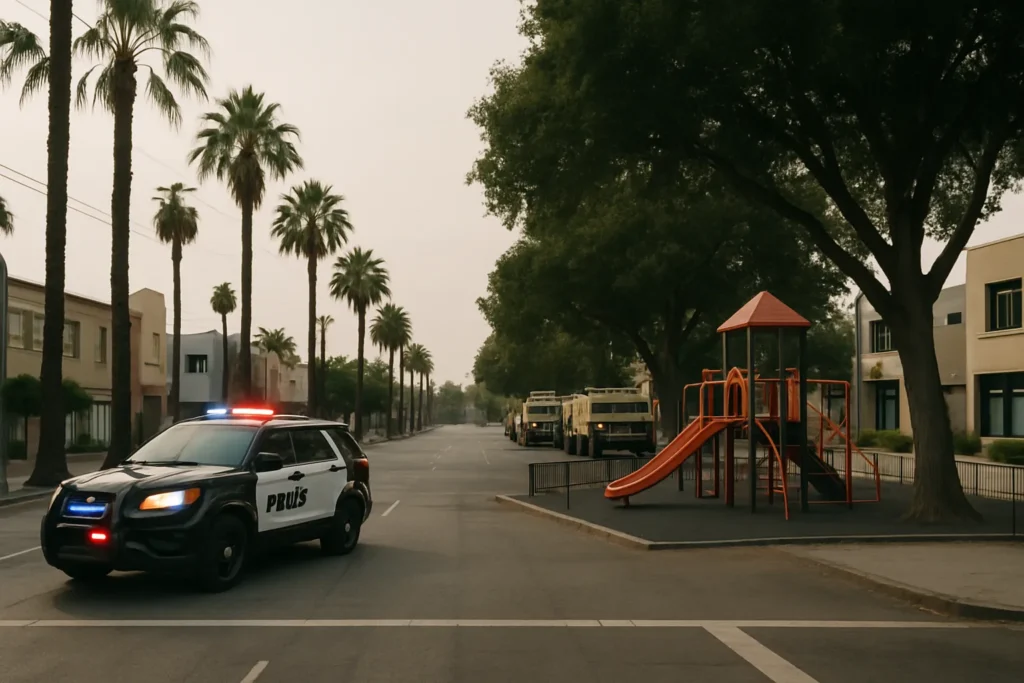Tense Standoffs: Military Deployments on American Soil
Federal troops marching through Los Angeles: the image feels less like current American reality than a scene from a bygone era, a sharp reminder of civic tensions long believed resolved. Yet in the summer of 2025, President Trump’s administration has brought back the uneasy echoes of the past, sending nearly 2,800 uniformed personnel—2,100 National Guard troops and now 700 active-duty Marines—onto city streets. The purported justification: to support massive immigration raids targeting undocumented communities. But the profound legal and ethical questions of using the military in such a domestic context remain, rekindling a debate as old as the republic itself.
The federal government’s initiative coincides with sweeping protests across Los Angeles and major U.S. cities, part of a national wave challenging what activists call an “abusive and racist crackdown” that disproportionately impacts communities of color. California officials, led by Governor Gavin Newsom, have moved to challenge the expansion, with the state suing to restrict federal troops’ powers to defending federal property, not policing communities. The Justice Department frames California’s lawsuit as political grandstanding, but the stakes are clear. Civil liberties lawyers warn that military intervention in civilian law enforcement risks violating not only the Posse Comitatus Act, but the very fabric of democracy.
Protestors, activists, and faith leaders have cited historic parallels, from the civil rights battles of the 1960s to the aftermath of Rodney King, raising the specter of state violence against Americans exercising their right to dissent. “Deploying Marines against people protesting injustice crosses a line we once thought inviolable,” notes Dr. Mark Tushnet, constitutional scholar at Harvard. At a Wednesday night demonstration, police used flash-bangs and foam rounds to disperse crowds. The fear on the ground is palpable—and hardly reflective of a nation secure in its constitutional bearings.
Legal Lines: The Clash Between State and Federal Power
What happens when a president decides to blur the lines separating law enforcement and military power? For constitutional scholars, the Los Angeles deployments represent a direct challenge to the fragile balance of states’ rights and federal authority. Federal law (and American tradition) generally bars the use of military force for civilian policing. Yet time and again, American history tells a more complicated story: presidents from Eisenhower (in Little Rock) to Reagan (during civil unrest) have sent soldiers to restore order—sometimes at great cost to civic trust.
California’s request for a federal injunction argues that Trump’s maneuver amounts to “political theater at the expense of public safety.” In Governor Newsom’s words, “This administration is inflaming tensions not diffusing them, turning cities into battlegrounds instead of communities.” According to the ACLU, the precedent for armed federal troops playing a visible role in local policing—especially on immigration—”undermines civilian control of the government, and turns fear into a tool of policy.”
“It’s hard to imagine anything more corrosive to public trust than armored vehicles rolling down Wilshire Boulevard in the name of ‘law and order.’ We’ve seen what happens when military power answers social unrest: communities are traumatized, not healed.”
Beyond that, experts warn of the long-term implications. Elizabeth Goitein, co-director of the Liberty and National Security Program at NYU’s Brennan Center, stresses that “every time a president stretches the boundaries of emergency power, the threshold for future overreach gets lower. Today’s crisis becomes tomorrow’s normal.” The court must weigh not just the immediate legal questions, but the broader implications for American democracy—a democracy tested by every swing of the political pendulum, and increasingly, by executive orders that test the Constitution’s seams.
Lives in the Crossfire: Whose Security, Whose Freedom?
The spectacle of young Marines lining up outside Los Angeles courthouses and ICE buses brings a sobering reality to the families and neighborhoods most affected. Immigrant communities already live with the daily fear of detention and separation, a fear now exacerbated by street closures, protest crackdowns, and escalating confrontations. Farm owners in California’s Central Valley have already reported disruptions in harvests and mounting anxiety as workers stay home to avoid raids—in some cases, fruit left rotting in the fields, echoing economic self-sabotage reminiscent of the harsh immigration policies of the Trump years.
Even as the national conversation whirls around the legality and optics of federal deployments, on the ground the results are heartbreakingly simple: parents fearing to take their children to school, neighbors watching tanks idle near parks, students—many citizens—uncertain whether next week they’ll be able to return to class. “No policy that depends on terrorizing families into silence is morally defensible,” observes Angelica Salas of the Coalition for Humane Immigrant Rights. According to a 2023 Pew Research survey, nearly two-thirds of Americans believe military involvement in local policing erodes trust and stokes tensions rather than restores order.
Is this who we want to be as a country—one that solves the challenges of migration and diversity by force, or one that chooses dialogue and inclusion over division? The answer, and responsibility, lies with each of us: not in the clamor of flash-bangs, but in the insistence on constitutional rights, civic dignity, and the shared promise of the American dream.

